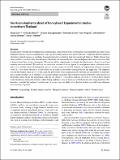| dc.description.abstract | In many parts of South and Southeast Asia, rural farmers living at the borders of protected areas frequently encounter Asian elephants (Elephas maximus) raiding their crops and threatening farmers lives and livelihoods. Traditional deterrent methods often have limited success as elephants become habituated or alternate their movement and behavior. While African bees (Apis mellifera scutellate) have been shown to effectively and sustainably deter African elephants (Loxodonta africana) little is known about their Asian counterparts. We conducted two experiments to estimate the effectiveness of bees as an Asian elephant deterrent method. We analyzed the behavioral reaction of seven captive Asian elephants when confronted with a fence of A. mellifera hives blocking their way to a desired source of food. In addition, we explored the defensive reaction of five A. cerana hives and six A. mellifera hives to an artificial disturbance during both day and night time. The elephants crossed the beehive fence in 51% of the cases, the probability of crossing increased over time and the number of exposures had a significant effect on an elephant’s crossing probability, indicating that elephants became habituated to the presence of the beehive fence. In the bee experiment, only one out of five A. cerana hives and one out of six A. mellifera hives reacted to the disturbance during the daytime, while during nighttime, none of them reacted defensively after being disturbed. We, therefore, conclude that neither A. mellifera nor A. cerana bees are likely to be effective in deterring wild Asian elephants from entering crop fields. | en_US |

